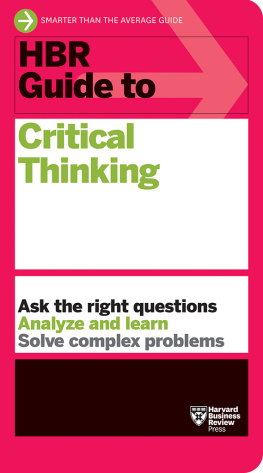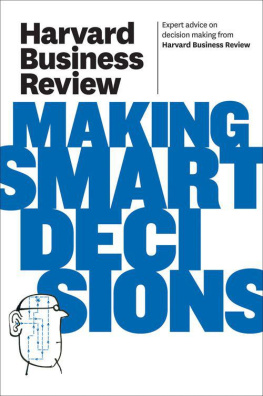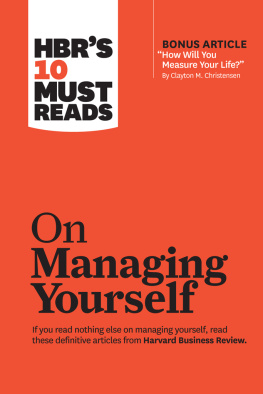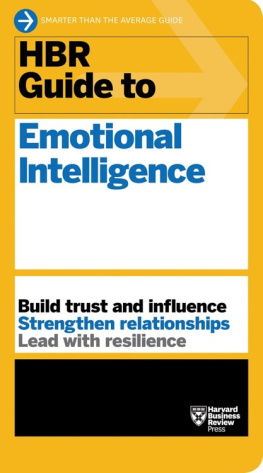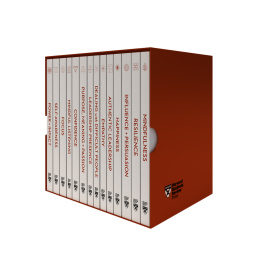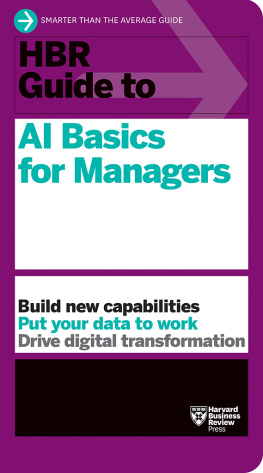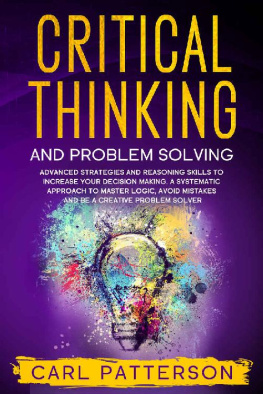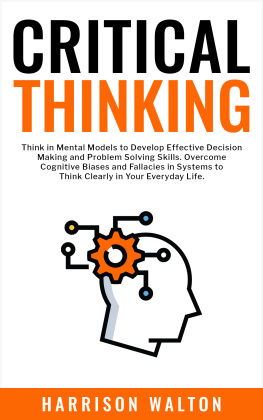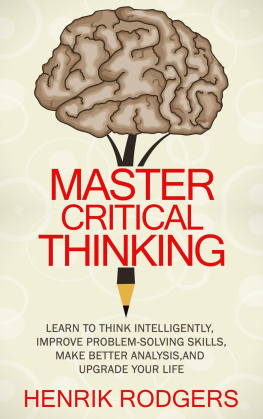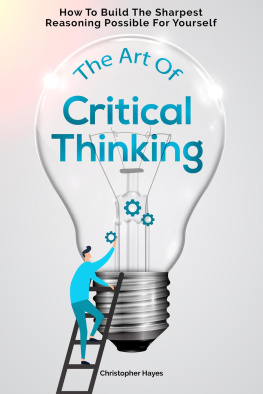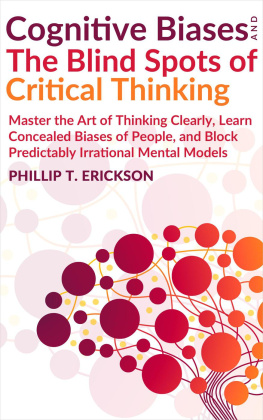HBR Guide to
Critical Thinking
Harvard Business Review Guides
Arm yourself with the advice you need to succeed on the job, from the most trusted brand in business. Packed with how-to essentials from leading experts, the HBR Guides provide smart answers to your most pressing work challenges.
The titles include:
HBR Guide for Women at Work
HBR Guide to Being a Great Boss
HBR Guide to Being More Productive
HBR Guide to Better Business Writing
HBR Guide to Better Mental Health at Work
HBR Guide to Building Your Business Case
HBR Guide to Buying a Small Business
HBR Guide to Changing Your Career
HBR Guide to Coaching Employees
HBR Guide to Collaborative Teams
HBR Guide to Data Analytics Basics for Managers
HBR Guide to Dealing with Conflict
HBR Guide to Delivering Effective Feedback
HBR Guide to Emotional Intelligence
HBR Guide to Finance Basics for Managers
HBR Guide to Getting the Mentoring You Need
HBR Guide to Getting the Right Job
HBR Guide to Getting the Right Work Done
HBR Guide to Leading Teams
HBR Guide to Making Better Decisions
HBR Guide to Making Every Meeting Matter
HBR Guide to Managing Flexible Work
HBR Guide to Managing Strategic Initiatives
HBR Guide to Managing Stress at Work
HBR Guide to Managing Up and Across
HBR Guide to Motivating People
HBR Guide to Negotiating
HBR Guide to Networking
HBR Guide to Office Politics
HBR Guide to Performance Management
HBR Guide to Persuasive Presentations
HBR Guide to Project Management
HBR Guide to Remote Work
HBR Guide to Setting Your Strategy
HBR Guide to Smarter Networking
HBR Guide to Thinking Strategically
HBR Guide to Work-Life Balance
HBR Guide to Your Professional Growth
HBR Guide to
Critical Thinking
HARVARD BUSINESS REVIEW PRESS
Boston, Massachusetts
HBR Press Quantity Sales Discounts
Harvard Business Review Press titles are available at significant quantity discounts when purchased in bulk for client gifts, sales promotions, and premiums. Special editions, including books with corporate logos, customized covers, and letters from the company or CEO printed in the front matter, as well as excerpts of existing books, can also be created in large quantities for special needs.
For details and discount information for both print and ebook formats, contact .
Copyright 2023 Harvard Business School Publishing Corporation
All rights reserved
Printed in the United States of America
10 9 8 7 6 5 4 3 2 1
No part of this publication may be reproduced, stored in or introduced into a retrieval system, or transmitted, in any form, or by any means (electronic, mechanical, photocopying, recording, or otherwise), without the prior permission of the publisher. Requests for permission should be directed to , or mailed to Permissions, Harvard Business School Publishing, 60 Harvard Way, Boston, Massachusetts 02163.
The web addresses referenced in this book were live and correct at the time of the books publication but may be subject to change.
Library of Congress Cataloging-in-Publication Data
Names: Harvard Business Review Press, issuing body.
Title: HBR guide to critical thinking / Harvard Business Review.
Other titles: Harvard Business Review guide to critical thinking | Harvard business review guides.
Description: Boston, Massachusetts : Harvard Business Review Press, [2023] | Series: HBR guides | Includes index. |
Identifiers: LCCN 2022031122 (print) | LCCN 2022031123 (ebook) | ISBN 9781647824464 (paperback) | ISBN 9781647824471 (epub)
Subjects: LCSH: Critical thinking. | Problem solving. | Decision making. | Industrial management. | Success in business.
Classification: LCC BF441 .H365 2023 (print) | LCC BF441 (ebook) | DDC 153.4/2dc23/eng/20220825
LC record available at https://lccn.loc.gov/2022031122
LC ebook record available at https://lccn.loc.gov/2022031123
ISBN: 978-1-64782-446-4
eISBN: 978-1-64782-447-1
The paper used in this publication meets the requirements of the American National Standard for Permanence of Paper for Publications and Documents in Libraries and Archives Z39.48-1992.
What Youll Learn
Do curiosity and logic guide you to innovative solutions at work? Do you seek outside perspectives when solving tough problems? Do you recognize the importance of data in decision-making?
When youre navigating a complex scenario, critical thinking is an essential skill for exploring potential paths ahead of you. But its not always so simple. You must be able to hold your hypotheses loosely, examine all aspects of a situation, keep your mind open to new and contradictory information, and use quantitative and qualitative research to back up your choices.
Fortunately, you can learn critical thinking. This guide will provide you with the advice and tips you need to understand and apply key elements of this important skillfrom taking a hard look at the problem and asking the right questions to seeking differing perspectives and analyzing informationso that you can make smarter thinking a habit and reach better outcomes.
Youll learn to:
- See why critical thinking is essential to your career growth
- Recognize and detach yourself from your assumptions
- Decide quickly with reflective urgency
- Ask questions to better understand the problem
- Think scientifically to avoid unconscious bias
- Assess data carefully to gain an evidence-based perspective
- Remain open-minded when listening to other peoples opinions
- Become an integrative thinker to find creative solutions
- Use the elements of critical thinking to enhance your learning
Contents
Understanding its key elements.
How to learn this essential skill.
AN INTERVIEW WITH HELEN LEE BOUYGUES BY CURT NICKISCH
Allow yourself time to think.
BY JESSE SOSTRIN
Be a knowledgeable skeptic.
BY STEFAN THOMKE AND GARY W. LOVEMAN
Defamiliarize yourself from what you know.
BY ADAM BRANDENBURGER
Reframe them to reveal unexpected solutions.
BY THOMAS WEDELL-WEDELLSBORG
Imprecise language can lead to imprecise solutions.
BY DANIEL MARKOVITZ
Understand when to focus and when to pull back.
BY ROSABETH MOSS KANTER
Apply rigor to your curiosity.
BY JOHN COLEMAN
Reach better conclusions and avoid tedious rework.
BY TOM POHLMANN AND NEETHI MARY THOMAS
How was it sourced, how was it analyzed, and what was left out?
BY ERIC HALLER AND GREG SATELL
It will help you focus on the future.
BY ALAN H. PALMER
Start by admitting you might be wrong.
BY SHANE SNOW
See past your blind spots.
BY CHERYL STRAUSS EINHORN
Engage and learn, even when your viewpoints clash.
BY FRANCESCA GINO
Discuss data; dont predict outcomes.
BY JOSHUA BECKER, DOUGLAS GUILBEAULT, AND EDWARD NED SMITH
Techniques to help you hear, process, and respond.
BY CHRISTINE M. RIORDAN

